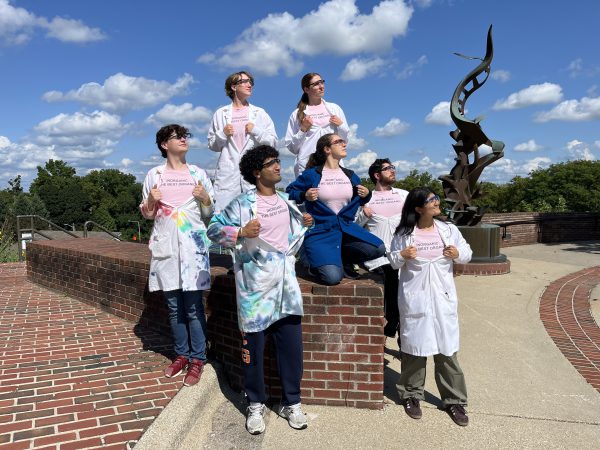A new grant awarded to a faculty member in the Department of Chemistry and Biochemistry will provide seed money for new research and support Kalamazoo College students performing lab work over the next two years.
Roger F. and Harriet G. Varney Assistant Professor of Chemistry Daniela Arias-Rotondo, affectionately known to her students as Dr. DAR, has earned an American Chemical Society Petroleum Research Fund award. The honor bestows $50,000 to her work while backing her lab’s upcoming research regarding petroleum byproducts.
Arias-Rotondo’s lab traditionally develops molecules that absorb energy from light while transforming that energy into electricity. The grant will allow her and her students to take molecules they have designed to act as catalysts and unlock chemical transformations through a process called photoredox catalysis. In this case, those transformations involve petroleum byproducts and how they might be used.
“When you extract petroleum, you get crude oil, and crude oil gets refined to make things like diesel fuel and the gasoline that you put in your car,” Arias-Rotondo said. “The petroleum byproducts that come with it are compounds that we cannot use in our cars or to generate electricity. But if we can turn those molecules into plastics, pesticides or medicines, for example, we would add value to the byproducts. It’s a highly desirable research avenue because we can potentially turn this waste into something we can use.”

The grant requires that at least 40% of the funds be used to support students. Some students currently working in Arias-Rotondo’s lab note how grateful they are, not only to work alongside her, but to be paid for their efforts thanks to similar grants. Will Tocco ’26, for example, said that being able to do summer lab work prepares him for classes and labs during the academic year and can set him apart on grad school applications when institutions look for research experience.
“The grants that Dr. DAR has received in the past have made it possible to be here this summer,” Tocco said. “They paid for me to attend the national American Chemical Society Conference this last spring and present a poster there. They have sponsored my research and all of the expenses that go along with that. They’re the reason why I’m able to be do this work.”
Unayza Anika ’26 added that the lab work reflects the kind of experience students can expect at K.
“It’s obviously rigorous, and it’s teaching me so much more than what I would have learned in classrooms,” Anika said. “It also involves a lot more personal attention that I can get from a faculty member who has a Ph.D. I’ve personally grown a lot.”
“What I really appreciate about this grant is how much of a focus there is on supporting students,” Arias-Rotondo said. “It’s going to help us give students the chance to be in the lab and not have to decide between that and affording something else. The grant helps them do exciting research, and they will learn a lot that’s not just about chemistry. It will also teach them how to conduct themselves in a lab, how to manage their time and how to think like scientists. That’s going to be super important for the future.”
